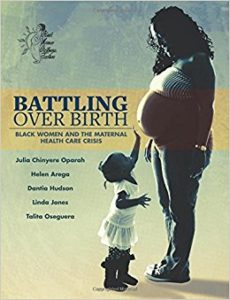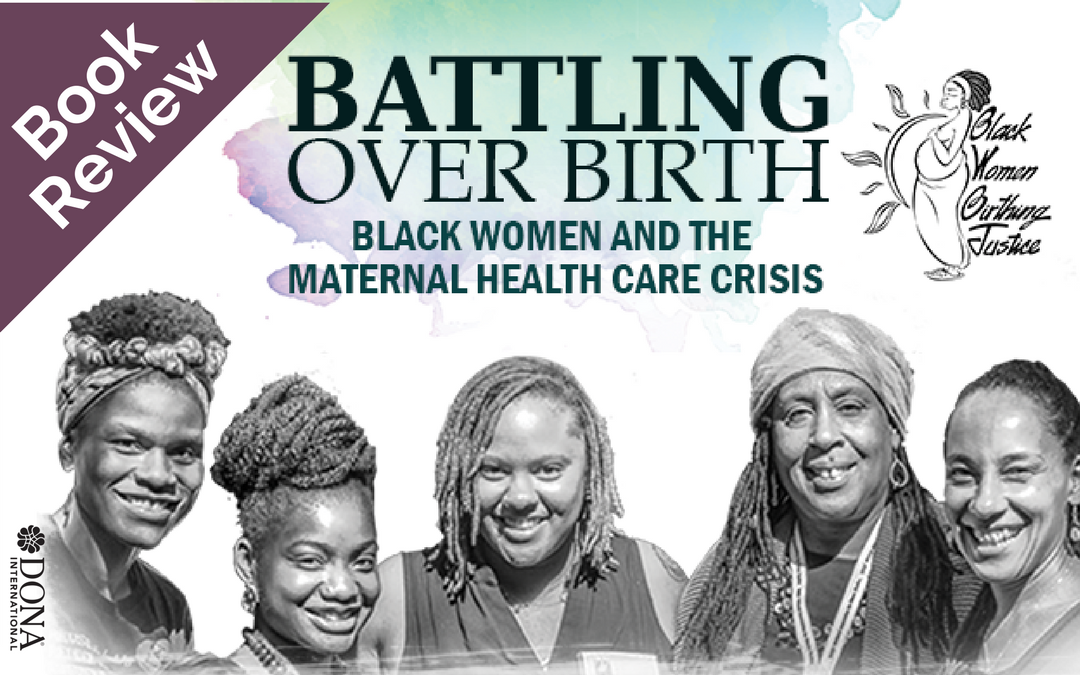By Sharon Muza, BS, CD(DONA), BDT(DONA), LCCE, FACCE, CLE
Today in the United States is the last day of Black History Month 2018. The end of this annual reflective month does not mean that the issue of Black parents dying four times more frequently than their white counterparts during the childbearing year goes away. It does not level the playing field for Black babies who are twice as likely to die as their white peers in the first year of life. It is not helpful to forget that one in seven Black babies are born prematurely or at term but with a low birth weight. These issues are real for Black families, and they will continue to be a reality unless something changes. As doulas and people who work with families in the perinatal period, we must never turn our backs to these inequities. We have a responsibility to continue to work towards improving this situation. To put it simply, improvement means lives are saved and fewer people die.
Battling Over Birth: Black Women and the Maternal Health Care Crisis is a new book published by Praeclarus Press that speaks clearly and profoundly to the current state of African-American and multiracial maternity and neonatal experiences and outcomes in the United States today. This book is written by an expert team of authors: Julia Chinyere Oparah, Helen Arega, Dantia Hudson, Linda Jones, and Talita Oseguera from the Black Women Birthing Justice organization. The research that went into this book included recording interviews and experiences of Black parents who had given birth or experienced a loss in the past five years. The authors also reached out to medical and birth professionals along with maternal-infant health experts.
Through this in-depth discovery of specific experiences of Black people birthing in America today, along with the insight and knowledge of researchers and experts, the final product is an accurate and chilling snapshot of the state of birthing as a Black person in 2018. The book is divided into five chapters that cover pregnancy, labor and birth, the postpartum period, birth locations and interactions with healthcare providers. As the reader works their way through the chapters, they see the stark reality of what it means for Black consumers (and their babies) to navigate maternity care today. The barriers at every point in the process are clearly described, the facts presented in their entirety without the mincing of words and the outcomes as a result of these failings are haunting.
Thoughtful and insightful recommendations are made at the close of each chapter, so that anyone, regardless of their role, can initiate some action steps for helping to change the situation. The current facts surrounding Black parent and baby mortality and morbidity rates and the reasons for these outcomes are presented from a human rights perspective and conclude, rightly so, that the current state is a human rights violation under the global Human Rights in Childbirth non-governmental organization guidelines. The US government has signed on to and acknowledges these rights for every person.
“Placing these human rights at the center of the conversation about maternal health care pushes us to ask how birthing individuals are experiencing their maternal health care, and how to pay attention to whether their care includes adequate care, fully informed consent or discriminatory treatment and outcomes.”
 As a data geek, one thing I really appreciated about this book is the useful collection of resources, citations, and studies that support the statements and topics covered in each chapter. For someone interested in more information in a specific area, it is very helpful. As a birth professional, reading this book helped me to understand how I contribute to this crisis and what I can do as a doula, childbirth educator and writer to help the situation so that lives can be saved.
As a data geek, one thing I really appreciated about this book is the useful collection of resources, citations, and studies that support the statements and topics covered in each chapter. For someone interested in more information in a specific area, it is very helpful. As a birth professional, reading this book helped me to understand how I contribute to this crisis and what I can do as a doula, childbirth educator and writer to help the situation so that lives can be saved.
This book is not easy to read, and the direct experiences of Black people during their pregnancy, birth and postpartum period are sad, haunting, frustrating, shocking and simply unconscionable. I could have chosen not to finish this book, or even read it at all. That is my white privilege that allows me to ignore the issues that exist today. Black parents and babies do not have that choice. Please don’t shy away from exploring this book because of the difficult subject matter. Racism, white privilege, and current inequities are the reasons that Black parents and babies are dying. These facts are important, and once doulas have a clear understanding of the experiences and realities that Black families face, we can do better and help our peers to do the same.
I am grateful and appreciative of the authors’ time and effort in creating this comprehensive and accurate resource that reflects the current state of birthing as a Black person. This book clearly lays out the barriers facing Black families, but it also offers solutions. I think every professional who works with parents and babies of any color should read this book. We are responsible for creating this situation and we all have a responsibility to fix it. Black parents and babies’ lives depend on it.
Have you had a chance to read this book? I would be interested in your thoughts.



I want to thank and commend you for this post, and for your thoughtful and passionate expressions. This looks to be a powerful resource and I am TRULY grateful to be a DONA member. I am purchasing this book TODAY! As a woman of color and a doula, it means so much to have such a powerful and dedicated organization make continued strides to help reduce disparities and increase awareness. THANK YOU!
Thank you.
Thank you for sharing your thoughts about the book Sharon. Researching and writing this book was truly a labor of love. We are grateful to all the women who shared their most intimate and vulnerable moments to make this book a possibility. Chinyere Oparah on behalf of the authors.
The thanks are from me to all of you!
Thank you so much for your review, and I look forward to reading this book. It will become required reading for all our new Hypnobabies Instructor Trainees.